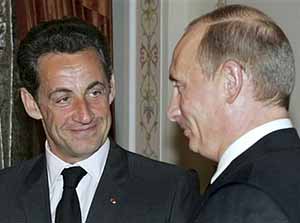October 10, 2007 (the date of publication in Russian)
Yaroslav Butakov
WILL SARKOZY BELIEVE IN RUSSIA?
Or, become a stronger atlanticist than George W. Bush?
 On October 9-10, Nicolas Sarkozy, President of the French Republic, paid an official visit to Moscow. He was a guest of Russia for the first time in his presidential capacity, which he achieved in May 2007.
On October 9-10, Nicolas Sarkozy, President of the French Republic, paid an official visit to Moscow. He was a guest of Russia for the first time in his presidential capacity, which he achieved in May 2007.
Was Sarkozy hurrying to meet with Vladimir Putin before the end of his presidential tenure? Did he just demonstrate French politeness, accepting the invitation to arrive in Moscow from Mr. Putin during the latest summit of G-8 in Heiligendamm, Germany?
Though Russian and French observers did not expect much of the visit, the relations between the two countries spectacularly intensified shortly before the Moscow talks. A week before Sarkozy's arrival, Russian Orthodox Church Patriarch Alexy II spent four days in France, meeting with Sarkozy and addressing PACE with a programmatic speech, focusing on inter-confessional dialogue and the necessity to overcome today's crisis of spiritual values in the world. The same emphasis was made in the Patriarch's TV presentation before the French audience.
The program of Sarkozy's visit to Moscow was hard-driving as well. The two presidents unveiled the monument to the Normandy-Neman aviation regiment in Lefortovo and discussed joint projects in aerospace and missile technologies. In particular, Sarkozy looked forward to the participation of the next President of Russia in the launch of a Soyuz spaceship from the Kourou cosmodrome in French Guyana in 2008.
In their personal discussion, however, Sarkozy and Putin could not avoid a serious debate on issues like the Iranian nuclear program, lately strongly denounced by France, as well as the future of the Balkan region where both nations have got significant interests.
The orchestration of the new round of the Moscow-Paris dialogue by major Paris media revealed a strong desire to force Sarkozy into a harsher approach towards Russia. Except the issues of Iran and Kosovo's independence, the French leader was supposed to raise two more crucial problems:
1) Europe's energy independence. In this context, Nicolas Sarkozy was expected to urge Russia to sign the European Energy Charter and give up its "gas tariff wars" with a number of East European nations.
2) Expansion on NATO. The French leader was supposed to insist that Russia suspend its support of post-Soviet unrecognized states in Eastern Europe and the Caucasus, and display tolerance towards Georgia's and Ukraine's entry in NATO as well as towards deployment of US ABM facilities in Poland in Czech Republic.
Still, the media coverage was diverse. Characterizing the relations between Russia and the West as "deteriorated" and close to a new "Cold War", Le Figaro's analyst Isabelle Lasserre explained Kremlin's latest "aggressive" intonations with a desire to convince the whole Western community that Russia has re-established itself as a great power, and intends to protect its sovereignty, to implement its national interests, to remind about itself on the global scene where it had been neglected for years, and to compensate the humiliation, experienced by Russians in the process of USSR's disintegration and the relevant crash of Russia's defense capability.
Figaro's author views Russia's efforts to prevent recognition of Kosovo's independence through the UN Security Council as an attempt to remind the world community of importance of its own. Though the United Nations is today the only international forum where the United States and the EU treat Russia as an equal partner, Isabelle Lasserre urges the West to take Russia's concerns into serious consideration. The author quotes F. Gainsbourg, an expert from Le Fondation pour la Recherche Strategique, as saying that "in case Western nations are not quite convinced of their own omnipotence and ability to impose its influence upon Russia, they should seek a compromise" – not only in the issues of Kosovo but also in the subjects of NATO expansion and Iran's nuclear program.
A new article of Andre Glucksmann, a well-known social analyst and a professed Russia-hater, published in Le Journal du Dimanche, expressed a diametrically opposite view. The author was trying to dismay the audience with "dictate of an oil tsar", and to "separate issues of human rights from Realpolitik". "Putin's democratic counterparts, led by Nicolas Sarkozy, have got enough arguments to intimidate Moscow's would-be hawks, immoral but shrewd. We should not give away Ukraine and Georgia, as well as the liberties in Russia for which my friend Anna Politkovskaya was sacrificed", pathetically appealed Mr. Gluecksmann.
The character of liberties for which the social philosopher is striving, is clear both from this reference and from Mr. Glucksmann's manifesto in support of Chechen warlords. Ironically, the same paper recently blamed Mr. Sarkozy himself for neglect of the freedom of expression. According to a popular version, the paper was going to publish the sensational story about the reluctance of Sarkozy's wife to vote for her own husband. However, the paper's owner Arnaud Laguarder, a close friend of Nicolas Sarkozy, demanded that the report be erased.
In this way, liberal masterminds are trying to force Sarkozy to pressure Russia on behalf of the whole Atlanticist community. The outcome of this debate will be clear months later. Today, Vladimir Putin is urging his French counterpart to "believe in Russia", referring to the expression of a XIX-century poet and diplomat Fyodor Tyutchev. Will Sarkozy prefer an "irrational" recognition of the Land of the North to the "comme il faut" confrontation with Moscow?
Number of shows: 1070
 ENG
ENG 

 ENG
ENG 
